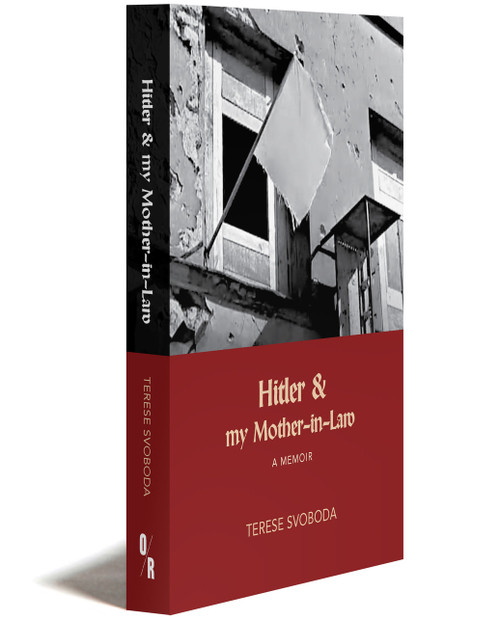The Man Who Gave Me A Biscuit
“Ms. Woolcock has devoted career life to finding poetry in unexpected places.”
—The New York Times“An engaging memoir of her own liberation from stuffy colonial post-war Argentina, a radical South American history lesson, and a passionate call-to-arms for now. It is warm, urgent and necessary.”
—David Farr“Simple and generous . . . I find her work like Octavia Butler or Ursula Le Guin . . . she permits you to make up your own mind and that’s a beautiful and most-effective trick.”
—10FOOTabout the bookabout
When setting out to write a memoir about growing up in in the little-known British Community of Buenos Aires, Penny Woolcock anticipated recounting her escape from a sheltered childhood where girls like her were trained for marriage and polite society. But she soon discovered that behind a genteel façade of afternoon tea and games of hockey lay a much darker story, one of mass killings and amnesia.
The Man Who Gave Me a Biscuit braids together memories of a tumultuous adolescence, which saw Woolcock join a radical theatre group and fall in love with the most unsuitable man she could find, and reflections on the legacy of violence and authoritarianism that to this day permeates her country of birth.
In these pages we learn of the “Conquest of the Desert”, a genocide that took place fifteen years after her great grandparents’ arrival from Europe; a succession of military coups, including the murderous Junta of the 1970’s; the surreal idiosyncrasies of Peronism; and the madness of today’s President Javier Milei, whose key advisor is his dead mastiff, Conan.
In turns funny, painful, entertaining and downright terrifying, this story in chiaroscuro superbly contrasts the excitement of a teenager’s world opening up, and the brutality of a society shut down by repression and fear.
About The Author / Editor
Preview
After several days tramping around town and drinking too much coffee, I stumbled across El Bar Moderno. The perfect name. Mum was always moaning, ‘Penny, why do you have to be so modern?’ I peered in. It was a long, dark bar, but I could just make out a table full of what looked to me like artists sitting in and beards, and I was particularly excited to see that one of them had paint splashes on his clothes and a beret like Che Guevara’s. There were two serious-looking women, but I wasn’t interested in them. I sashayed in casually and although the bar was almost empty, I carefully positioned myself at a small table nearest the group. I ordered a cafecito from the middle-aged waiter, pulled out a Jockey Club filtered cigarette from its classic soft red packet with a little drawing of a jockey’s cap and crop, and sparked up. I kicked myself for not asking them for a light. Idiot. I sat trying to look as though I was lost in artistic thoughts and attempted to blow a smoke ring. It was a messy blur and I glanced nervously over at the artist’s table to check whether anybody had noticed. They were all talking over each other so it was hard to figure out what they were saying. I made out odd phrases, ‘exquisitamente racional’, and I heard the word ‘intelectual’ which I took as a good sign because I had read the whole of The Idiot, which had really depressed me, and quite a bit of T. S. Eliot. The waiter brought me a black coffee in a tiny thick white cup with a teeny biscuit wrapped in cellophane on the saucer. I swallowed it in one and immediately regretted not making it last. I didn’t want to eat the biscuit so after unwrapping it I had nothing else to do. I lit a second Jockey Club from the first and peeped at the artists, clocking a handsome man holding forth. I smoked the cigarette down to the filter and started on a third but smoking so much was starting to make me feel sick, so I stubbed it out and glanced over again. A plain man with short hair and a kind face, sitting across from the handsome one, caught my eye. He smiled sympathetically, picked up a plate of chocolate biscuits and offered it to me. I yelped loudly and nearly fell off my chair.
‘No! No gracias!’
I hadn’t meant to squeal.
I knew exactly what he was up to. Mummy had warned me many times about strange men offering girls sweets and biscuits laced with heroin; if you accepted, you’d wake up in Morocco, in the tent of a sex obsessed sheikh, a slave in his personal harem. Years later you’d be spat out, drained by all that sex and shipped back to Argentina, spoilt goods, a pariah nobody would speak to, let alone marry, and that would be your life over. I could see the Sheikh clearly, towering over me in red and gold embroidered robes, flashing his teeth and eyes, waving a scimitar glinting in the sun, his thing, all red and poking out of his pantaloons. The kind man read my mind. He smiled, bit into one of the biscuits and offered me the other half. I was too embarrassed to refuse so I popped it in my mouth. He turned back to his friends.
I sat rigid while the biscuit coagulated into a lump of sludge on my tongue. I forced it down.
I didn’t dare look at the artist table. Light poured through a half-open door at the back of the dark bar, and I was pretty sure I could hear a getaway car waiting by the dustbins with the engine running. When I keeled over, they’d drag me out and nobody would ever find out what had happened to me. Clearly the waiter was in on it, he probably had a daughter of his own, and I wondered indignantly how he would like it if this happened to her? These people probably sat here every day, pretending to be artists, waiting for gullible girls to drug. The waiter only had to turn a blind eye to get his cut. I was sure an English girl would be worth quite a bit. I was probably the latest in a long line who had disappeared. Rubbed out. I thought how sad Mummy and Daddy would be even though they didn’t understand that I was an artist. I would have started crying if I hadn’t been so afraid.
I smoked another cigarette.
Nothing happened. Nothing at all. Eventually I called the waiter and asked for the bill. I paid and left, feeling perfectly well and very foolish.
After that I was afraid of nothing. I became reckless.
***
What I didn’t know back then was that a white slave trade had operated in Argentina between 1875 and 1936, but it did not involve abducting middle-class Anglo-Argentine girls and sweeping them off to satisfy the sexual proclivities of lusty sheikhs in the Middle East.
You have to flip these bogey stories to get the truth.
During the era of mass immigration to Argentina, therewas a surplus of lonely European gentlemen, two or three they were saving up to bring over fiancées they had left behind. One version has it that impoverished Eastern European women were tricked into coming to Argentina by the Zwi Migdal, an Ashkenazi network that lured young women to the New World with fake marriage contracts and put them in brothels when they arrived. A disproportionate number of Buenos Aires prostitutes were Jews but that doesn’t prove they were hoodwinked into coming. There was also a French organisation, Le Milieu, trafficking women from Marseille. Trafficking is a loaded word and although some women may have been tricked into crossing the ocean and forced into sex work, then as now it might be a rational choice for an impecunious young woman to choose sex work over domestic labour. Both are dictated by poverty, but it does give agency to sex workers, subverting the narrative of relentless victimisation.
I was never in danger of being enslaved, and my ancestors may well have availed themselves of the services of these women.
What is true is that thousands of women were abducted and vanished during the Dirty War from 1976 to1983 and most of them were left-wing, middle-class young women like me. But the original erasure remained unspoken.
in the media
The Man Who Gave Me A Biscuit
“Ms. Woolcock has devoted career life to finding poetry in unexpected places.”
—The New York Times“An engaging memoir of her own liberation from stuffy colonial post-war Argentina, a radical South American history lesson, and a passionate call-to-arms for now. It is warm, urgent and necessary.”
—David Farr“Simple and generous . . . I find her work like Octavia Butler or Ursula Le Guin . . . she permits you to make up your own mind and that’s a beautiful and most-effective trick.”
—10FOOTabout the bookabout
When setting out to write a memoir about growing up in in the little-known British Community of Buenos Aires, Penny Woolcock anticipated recounting her escape from a sheltered childhood where girls like her were trained for marriage and polite society. But she soon discovered that behind a genteel façade of afternoon tea and games of hockey lay a much darker story, one of mass killings and amnesia.
The Man Who Gave Me a Biscuit braids together memories of a tumultuous adolescence, which saw Woolcock join a radical theatre group and fall in love with the most unsuitable man she could find, and reflections on the legacy of violence and authoritarianism that to this day permeates her country of birth.
In these pages we learn of the “Conquest of the Desert”, a genocide that took place fifteen years after her great grandparents’ arrival from Europe; a succession of military coups, including the murderous Junta of the 1970’s; the surreal idiosyncrasies of Peronism; and the madness of today’s President Javier Milei, whose key advisor is his dead mastiff, Conan.
In turns funny, painful, entertaining and downright terrifying, this story in chiaroscuro superbly contrasts the excitement of a teenager’s world opening up, and the brutality of a society shut down by repression and fear.
About The Author / Editor
Preview
After several days tramping around town and drinking too much coffee, I stumbled across El Bar Moderno. The perfect name. Mum was always moaning, ‘Penny, why do you have to be so modern?’ I peered in. It was a long, dark bar, but I could just make out a table full of what looked to me like artists sitting in and beards, and I was particularly excited to see that one of them had paint splashes on his clothes and a beret like Che Guevara’s. There were two serious-looking women, but I wasn’t interested in them. I sashayed in casually and although the bar was almost empty, I carefully positioned myself at a small table nearest the group. I ordered a cafecito from the middle-aged waiter, pulled out a Jockey Club filtered cigarette from its classic soft red packet with a little drawing of a jockey’s cap and crop, and sparked up. I kicked myself for not asking them for a light. Idiot. I sat trying to look as though I was lost in artistic thoughts and attempted to blow a smoke ring. It was a messy blur and I glanced nervously over at the artist’s table to check whether anybody had noticed. They were all talking over each other so it was hard to figure out what they were saying. I made out odd phrases, ‘exquisitamente racional’, and I heard the word ‘intelectual’ which I took as a good sign because I had read the whole of The Idiot, which had really depressed me, and quite a bit of T. S. Eliot. The waiter brought me a black coffee in a tiny thick white cup with a teeny biscuit wrapped in cellophane on the saucer. I swallowed it in one and immediately regretted not making it last. I didn’t want to eat the biscuit so after unwrapping it I had nothing else to do. I lit a second Jockey Club from the first and peeped at the artists, clocking a handsome man holding forth. I smoked the cigarette down to the filter and started on a third but smoking so much was starting to make me feel sick, so I stubbed it out and glanced over again. A plain man with short hair and a kind face, sitting across from the handsome one, caught my eye. He smiled sympathetically, picked up a plate of chocolate biscuits and offered it to me. I yelped loudly and nearly fell off my chair.
‘No! No gracias!’
I hadn’t meant to squeal.
I knew exactly what he was up to. Mummy had warned me many times about strange men offering girls sweets and biscuits laced with heroin; if you accepted, you’d wake up in Morocco, in the tent of a sex obsessed sheikh, a slave in his personal harem. Years later you’d be spat out, drained by all that sex and shipped back to Argentina, spoilt goods, a pariah nobody would speak to, let alone marry, and that would be your life over. I could see the Sheikh clearly, towering over me in red and gold embroidered robes, flashing his teeth and eyes, waving a scimitar glinting in the sun, his thing, all red and poking out of his pantaloons. The kind man read my mind. He smiled, bit into one of the biscuits and offered me the other half. I was too embarrassed to refuse so I popped it in my mouth. He turned back to his friends.
I sat rigid while the biscuit coagulated into a lump of sludge on my tongue. I forced it down.
I didn’t dare look at the artist table. Light poured through a half-open door at the back of the dark bar, and I was pretty sure I could hear a getaway car waiting by the dustbins with the engine running. When I keeled over, they’d drag me out and nobody would ever find out what had happened to me. Clearly the waiter was in on it, he probably had a daughter of his own, and I wondered indignantly how he would like it if this happened to her? These people probably sat here every day, pretending to be artists, waiting for gullible girls to drug. The waiter only had to turn a blind eye to get his cut. I was sure an English girl would be worth quite a bit. I was probably the latest in a long line who had disappeared. Rubbed out. I thought how sad Mummy and Daddy would be even though they didn’t understand that I was an artist. I would have started crying if I hadn’t been so afraid.
I smoked another cigarette.
Nothing happened. Nothing at all. Eventually I called the waiter and asked for the bill. I paid and left, feeling perfectly well and very foolish.
After that I was afraid of nothing. I became reckless.
***
What I didn’t know back then was that a white slave trade had operated in Argentina between 1875 and 1936, but it did not involve abducting middle-class Anglo-Argentine girls and sweeping them off to satisfy the sexual proclivities of lusty sheikhs in the Middle East.
You have to flip these bogey stories to get the truth.
During the era of mass immigration to Argentina, therewas a surplus of lonely European gentlemen, two or three they were saving up to bring over fiancées they had left behind. One version has it that impoverished Eastern European women were tricked into coming to Argentina by the Zwi Migdal, an Ashkenazi network that lured young women to the New World with fake marriage contracts and put them in brothels when they arrived. A disproportionate number of Buenos Aires prostitutes were Jews but that doesn’t prove they were hoodwinked into coming. There was also a French organisation, Le Milieu, trafficking women from Marseille. Trafficking is a loaded word and although some women may have been tricked into crossing the ocean and forced into sex work, then as now it might be a rational choice for an impecunious young woman to choose sex work over domestic labour. Both are dictated by poverty, but it does give agency to sex workers, subverting the narrative of relentless victimisation.
I was never in danger of being enslaved, and my ancestors may well have availed themselves of the services of these women.
What is true is that thousands of women were abducted and vanished during the Dirty War from 1976 to1983 and most of them were left-wing, middle-class young women like me. But the original erasure remained unspoken.









